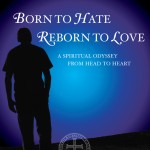On April 10, 2013, Klaus Kenneth came to speak about his amazing life, his journey through darkness and his discovery of the love of Christ. His story is described in his book Born to Hate, Reborn to Love, published by Mount Thabor Publishing.
Outdoor Spring Cleaning Help Needed: Apr. 27
2013 Parish Life Conference Speakers Announced
The special speakers for the 2013 Eastern Dioceses Parish Life Conference have been announced. They are: Patristics professor Dr. Christopher Veniamin, actor and musician Jonathan Jackson, Arabist and Yale Ph.D. candidate in Religious Studies Samuel Noble, and pastor and homeschooling father of six Fr. Noah Bushelli.
To read more about them and about what they’ll be presenting at the Parish Life Conference, click here.
Asceticism: How to Take Up the Cross

Sunday of the Adoration of the Holy Cross, April 7, 2013
Rev. Fr. Andrew Stephen Damick
A recording of this sermon is available via Ancient Faith Radio.
In the Name of the Father and of the Son and of the Holy Spirit, one God. Amen.
On this third Sunday of the Great Fast, we contemplate the mystery of the Cross of Jesus Christ. In this great mystery, we see sacrifice, atonement, the destruction of death itself. This Cross is at the center of who we are as Christians, so much so that the Apostle Paul said in 1 Corinthians 1:23 that the content of the preaching of the Gospel is “Christ crucified.” As Christians, we cannot get away from the cross any more than we could get away from Christ.
Yet the cross still scandalizes us. We may be willing to feel a certain sentimental pathos when we see Christ crucified. We are moved by what He did. We are sorrowful for what happened. We are grateful for His sacrifice. And we should be all of those things. But those feelings are only the beginning of what it means to make the Cross our own, what it means that we preach Christ crucified.
We have heard from the saints that we, too, must be crucified if we are to be true followers of the Crucified One. We must crucify our sinful passions. We must crucify our egos. We must crucify our addictions. We must crucify all our desires, our minds and, indeed, our whole selves. But why? And what does all this mean? Is this just flowery religious language whose only real referent in our daily lives is something that happens in the mind or in the emotions? Or is there something else here?
What I would like us to contemplate today is something found in the Gospel reading appointed for this mystery of the Cross. The Lord said: “If any man would come after Me, let him deny himself and take up his cross and follow Me. For whoever would save his life will lose it; and whoever loses his life for My sake and the Gospel’s will save it” (Mark 8:34-35).
We see from this call from our Lord Jesus that following Him means self-denial and taking up our crosses. Only in doing so can we follow Him. So a follower of Jesus is one who denies himself and takes up his cross. The language of self-denial is a bit more concrete than just religious emotion. If following Jesus means denying yourself, that that means that people who spend their time pursuing their own desires rather than God’s are not actually Jesus’ followers. This is a frequent refrain in Orthodox teaching: that we cannot be true Christians if our top priorities in life are not worship, education in the faith and sharing it with others through witness and service.
But what does it mean to “take up” the Cross? For some Christians, it means suffering the things that come your way, enduring the pain and suffering that comes from disease, disaster, etc., or even to endure persecution that comes from trying to be a Christian. And there is some truth to that.
For others, taking up the Cross doesn’t mean much at all. I think a lot of folks don’t hardly even think about it. It may be that they just don’t care about being true Christians, but it may also be that they just don’t know how. How do I take up my cross? Do I just wait until something bad happens to me and then try to bear it with a smile? What kind of spiritual life is that?
The Orthodox Church alone has preserved the full Christian teaching of what it means to take up the Cross, both in terms of the public preaching of the Church and in terms of the actual spiritual practice of the faithful Christian. In a word, taking up the Cross primarily means one thing: asceticism. Among Christians of our time, this emphasis on asceticism is unique to Orthodoxy. It is almost never mentioned and virtually unpracticed in the Protestant world, and while it exists in the Roman Catholic tradition, it is so de-emphasized that it is rarely practiced.
The English word asceticism comes from the Greek word askesis, whose essential meaning is “athletic training.” To engage in askesis is to train, to practice, to be strengthened, for the purpose of engaging in the contest. In a Christian context, asceticism is the actual steps taken in life to practice the self-denial that Jesus says is a prerequisite for following Him.
So what does it look like? How can we be ascetical? There are a number of ascetical practices preserved in the Church—fasting, vigils, lifelong celibacy, sexual continence even within marriage, giving up non-essential possessions, almsgiving, silence, to name a few. And in the monastic life there are some more or variations on these. We may also add some ascetical practices that are in the same spirit but are only expressible within the modern world, such as setting aside entertainment or avoiding Internet social media.
None of these things means punishing yourself. The purpose is not to create suffering. Rather, the theme in all of them is simplification and setting aside desires. In short, it is self-denial, to say “no” to what we want when we could say “yes.”
Now some might argue that such things are not to be found in the New Testament, that Jesus never meant for Christians to be ascetics. But asceticism is actually found everywhere in the New Testament, from the fasting of Jesus to the celibacy of Paul to the rough clothing and meager diet of John the Baptist to the personal poverty commanded by Jesus to the Apostles, not to mention the fasting commanded by Him. And Paul makes mention of “mortifying” his flesh so that he can live in Christ. In short, asceticism is everywhere in the New Testament, and we certainly know that it’s everywhere in subsequent Christian history.
But what does it do? Why is asceticism the way in which we properly take up the Cross and follow Christ? One of the central affirmations of Orthodoxy for how salvation works is that it is synergistic, that salvation requires a synergy of God and man working together. The will and action of God and the will and action of man make salvation possible. It is God’s grace that does all the work, but man must be receptive to that grace, or else nothing happens. Why? Because God created us with free will and loves us so much that He will never override it. In short, we only are saved as much as we want to be, as much as we cooperate to be.
So what asceticism does is train us for saying “yes” to God’s grace. Every time you look at a Philly cheesesteak in Great Lent and say “no,” your will gets a little stronger. Every time you don’t buy that shiny piece of jewelry or gadgetry just so you can have the latest thing, your will gets a little stronger. Every time you practice the vigilance of the eyes by looking away from that Victoria’s Secret advertisement on a billboard on the highway or on television, your will gets a little stronger. When you say to your husband or wife, “Do we really need a car that big?”, your will gets a little stronger.
And having strengthened your will, you are now more able to say “yes” to what you were made for—holiness, communion with God, wisdom, faith, hope, love. This is what Paul means when he says that we must “work out [our] salvation with fear and trembling” (Phil. 2:12). This is how we repent, how we learn to turn from obsession with created things to a focus on the Creator. It is not an instant experience that comes just because we make a decision for Christ or get baptized. It has to be worked out over time. Salvation is an eternal process, not a momentary status.
And that is also why Christian asceticism is traditionally adapted and customized according to the ability of each Christian—salvation is a process, not an achievement. Each of us has to walk the path as he can, and not everyone is at the same place on the path. That is also why asceticism is doable for everyone in some way.
Now, please do not think that asceticism earns you salvation. It doesn’t. There is nothing about any of these practices that makes you holy. Many religions practice asceticism, but that does not mean that their adherents are thereby becoming more like Christ. God doesn’t owe anyone salvation just because they don’t eat meat for a few weeks. Rather, what asceticism does, if practiced within the context of the Church and especially with prayer, is make us receptive to divine grace, which is the presence of God Himself.
If we would be crucified with Christ (Gal. 2:20), so that we may be His true followers, we have to take up the Cross, which means self-denial and asceticism. And in practicing it, we become stronger. We become freer. We become able to receive more of what God is giving us.
To the crucified and risen Jesus Christ, with His eternal Father and His all-holy and good and life-giving Spirit, be all glory, honor and worship, now and ever, and unto ages of ages. Amen.
The Sunday of Orthodoxy: Seeing God

Sunday of Orthodoxy, March 24, 2013
Rev. Fr. Andrew Stephen Damick
A recording of this sermon is available via Ancient Faith Radio.
In the Name of the Father and of the Son and of the Holy Spirit, one God. Amen.
Moses, found in the river by the daughter of Pharaoh, the King of Egypt, was raised in the Egyptian court and given all the luxuries of an Egyptian prince: wealth, power, influence, popularity. And yet upon reaching adulthood, he chose to leave behind a life which would have been the envy of everyone in Egypt and indeed throughout the world. He left behind his identity as an Egyptian prince and identified rather with the enslaved Hebrews, his true people. He chose to forsake his status as a master and voluntarily became a slave.
In today’s epistle reading, we hear not only of the powerful choice of Moses, but also of the decisions of numerous prophets and saints of the Old Testament. We hear how they subdued kingdoms, stopped the mouths of lions, worked righteousness, endured ridicule, abuse, poverty, torture and even death. Some were sawn in half, tempted or killed with the sword. They wore the worst kind of clothing and wandered in deserts, living homeless, rejected lives.
What could motivate all these Old Testament saints to do what they did? What made Moses leave behind the Egyptian palace? What made Daniel gladly go into the lions’ den? What inspired Esther to risk her life? What fueled the hearts of the Three Holy Children to endure the fiery furnace? What motivated the prophets to suffer rejection and even death? What was it that gave these people their courage?
To learn the answer to this question, we must look back, even before Moses and all the prophets, back to the first human beings, Adam and Eve. When Adam and Eve sinned, they were expelled from Paradise. The expulsion from Paradise was the liturgical theme for this past Sunday, as we stood on the threshold of Great Lent. The dominant image in the hymns of last weekend is Adam, sitting outside of Paradise and wailing as he mourns over what he has lost.
What did Adam lose? Did he lose a nice, green place to live, complete with palm trees and all kinds of fruit, populated with animals that he got to name himself, all accompanied by a woman made especially just for him by God? Yes, he lost all of that. But Paradise was much more than simply physical comfort and pleasant surroundings. What was the treasure that Adam lost, driving him to weeping on the doorstep of Paradise?
Adam lost his ability to see and experience God.
God made Adam and all of us with the purpose of seeing Him and having an intimate communion with Him, a direct experience of the divine life. It was this direct experience of God which made Paradise what it was, and when Adam sinned, he ripped himself away from God, expelling himself from the Paradise of life with the Holy Trinity.
When the Fall of Man occurred, the entire universe was thrown out of balance, because man was made by God to serve as the priest of all Creation, offering up the created world back to God for His blessing and invigoration. When the priest no longer offers up the sacrifice, it is no longer blessed and filled with the life God desires for it. And this is why we have so-called “natural” disasters, because the sin of man disconnects the whole cosmos from God.
And into the midst of this unbalanced Creation, where mankind has lost his ability to see and experience God, to connect to Him and to connect the world to Him, God chose to reconnect Himself to us.
He came to this earth and became a man, the God-man Jesus Christ. We could no longer see and experience God because of our spiritual disconnection, and so God chose to make a touchable, physical connection with us, by becoming one of us, by taking on a human body just likes ours, a human soul just like ours, by assuming our human nature into Himself, the same as us in every way except sin. And thus through the physical connection, we can receive the spiritual connection. Because our spiritual eyes had been blinded, the Lord came and appeared before our physical eyes. And if we look at Him with faith, then we see not only a man, but also the God before the ages.
The Scriptures tell us that Moses made the choice to leave behind Egyptian luxury for Hebrew slavery precisely because he had a vision of Christ, though he could not see Him clearly yet. The prophets and saints suffered and often died because they could see God in Christ. Historically, some lived before His time, certainly, but their desire to reconnect what Adam had disconnected was so powerful that God gave them a foretaste of His appearance in Christ. This is why Jesus said that even Abraham rejoiced to see His coming, centuries before his birth from the Virgin Mary.
Today is called the Sunday of Orthodoxy. Today should therefore tell us something about who we are as Orthodox Christians. And what is it that we remember and celebrate on the Sunday of Orthodoxy? We celebrate the historical event in the year 843 of the return of the icons to our churches, after more than a hundred years of iconoclasm, the heresy that taught that icons do not belong in the Christian life. Many people died for their faith, believing that icons were not only a normal but necessary part of what it means to be Christian. But why? What do icons have to do with Orthodoxy? What do we see in the icons?
The first and most significant of all the icons is the icon of Jesus Christ. When we look at His icon, we can see that God became a man: a real, flesh-and-blood man Whom you could see, touch, talk to, and draw pictures of. The icon of Christ tells us that He is a real man. The icon of Christ is a confirmation for us that God chose to reconnect Himself to us, to provide for us the way to see Him after Adam lost that ability. And the icons of all the saints tell us the same story, that here are real, living people who have seen God in Christ.
Some may look at the prohibition in the Ten Commandments against making what it calls “graven images” of God or the creatures of this Earth and bowing down to them and say that icons must therefore be idolatry and against God’s command. But those who say this probably are not considering the many images that God Himself directly commanded the people of Israel to put onto the Ark of the Covenant, in the Tabernacle, or throughout the Temple of Solomon. Imagery has always been intimately linked with the spiritual life, both for Jews and for Christians.
What is forbidden is not imagery, but idolatry, which is the worship of created things rather than the uncreated God. Idolatry’s essence is that it directs the worshiper not toward God, but toward a phantom, and this is the meaning of the Greek word eidolon from which our word idol comes. An idol is something false, something illusory, something transitory. But a true image, an eikon in Greek, points us instead to something which is true and real. And thus, Christ Himself in the New Testament is called the icon of the invisible God. With the coming of Christ, we now can quite literally see God.
Iconoclasm, the heresy which teaches against the use of icons, is thus precisely a denial of the Incarnation, which is why the overwhelming witness of 2000 years of Christian history supports the use and veneration of images as part of Christian worship of the Holy Trinity, but it does not support turning them into idols, as somehow magical objects with a power in themselves. They have no such power. There is only the power of God, which sometimes works through them, just as it has done through many physical objects both in Biblical and subsequent Christian history.
Therefore, when we look at the icons, touch the icons and venerate the icons, we are connecting not with wood and paint, but we are connecting through them to the living God, Jesus Christ. Today is called the Sunday of Orthodoxy precisely because icons are a powerful witness to what it is that we as Orthodox Christians are trying to achieve, through God’s grace. When mankind sinned, we lost our ability to connect to God. But if we have faith, He will grant us a vision and therefore an experience of Himself, according to the measure of our cooperation with Him. And having had that experience, we will find that we, too, have the courage, confidence, love and fire of the prophets and saints.
In the Gospel today, we read the story of Christ calling the Apostles Philip and Nathanael. When Philip sees Jesus, he goes to Nathanael and tells him that they had found the one Moses and the prophets were looking for: the Messiah, the promised Saviour. Receiving a vision and experience of Jesus, Philip recognized in Him the hope that Moses, the prophets, and all of his ancestors and family had shared for centuries.
His immediate response was to go out and share this experience with Nathanael, saying to him, “Come and see.” Having received the vision of Christ and experienced God, Philip immediately goes out to tell someone else, to reconnect someone else to the divine power that is meant for each of us to experience.
When Nathanael then goes to meet Christ for himself, he is amazed when Jesus tells him that He had seen him under the fig tree, even though no one had told Jesus about where Nathanael was sitting. But Jesus tells him that he will be amazed not only with that, but he will be granted a vision of heaven opening, and the angels of God ascending and descending on the Son of Man, Who is Jesus Himself.
Do we want to reconnect with God? Do we want to see heaven opened, and the truth of the meaning of our lives revealed? Do we want to be filled up with the energy of God Himself? Then let us accept the invitation of Jesus to come see Him. And the good news of the Gospel is that this invitation is not to some ephemeral, emotional or mental experience, but to a direct, physical encounter with the living God. The awesome miracle of the Incarnation is that what was untouchable is now touchable. What was invisible is now visible. What was inaccessible is now served to us in the holy power of His Body and Blood.
We see and experience Him in the icons, in private prayer, in the beauty of Creation, in the divine services, in the Holy Eucharist and all the sacraments, and we open ourselves up to this experience by faith, repentance and participation. This holy season of Great Lent affords more opportunities than any other time of year to have this vision. Having emptied ourselves of our sins by confession and receiving the gift of divine grace, we can receive the vision of Christ in glory. Bit by bit, the more we open ourselves, the more He shows Himself to us. And as we receive Him, our response should be to bring Him to the rest of the world, saying to them, “Come and see.”
To Him therefore be all glory, honor and worship, to the Father and to the Son and to the Holy Spirit, now and ever, and unto ages of ages. Amen.
- « Previous Page
- 1
- …
- 23
- 24
- 25
- 26
- 27
- …
- 30
- Next Page »





